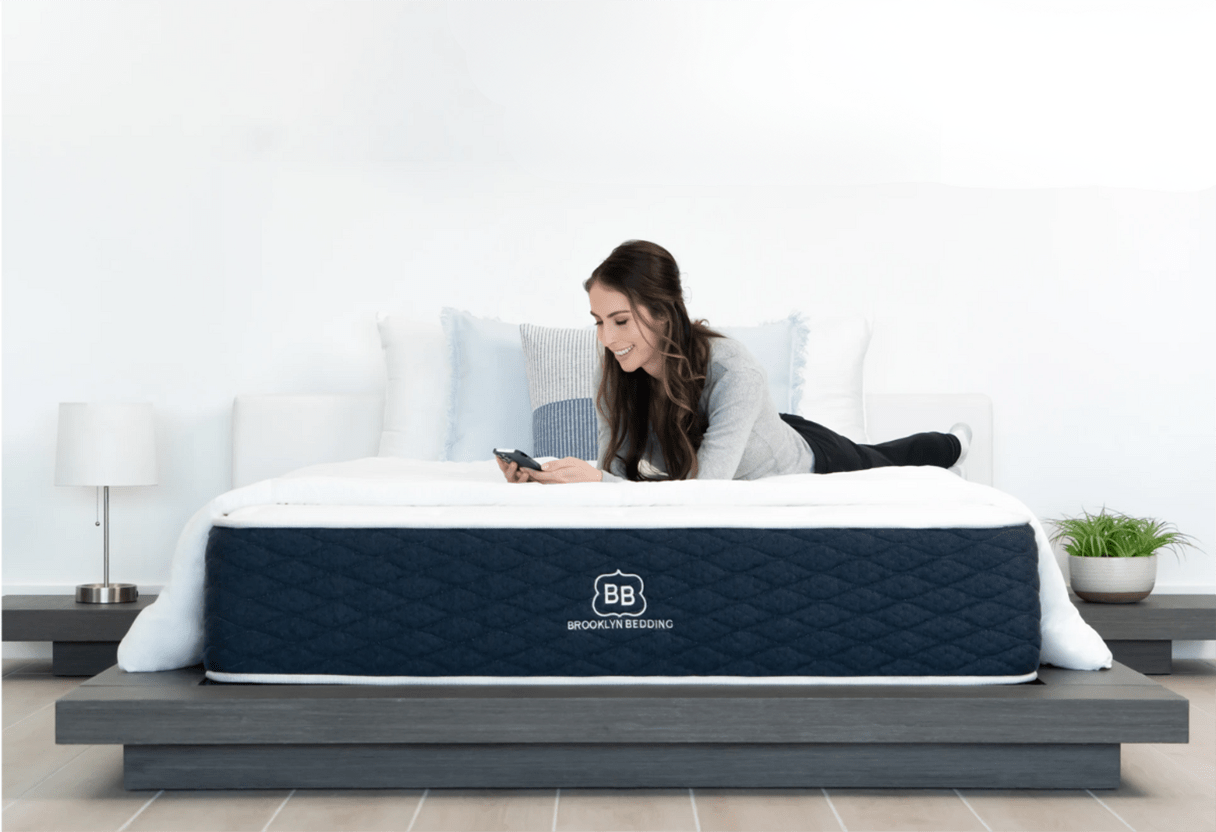Quality sleep is key to maintaining overall health and well-being. By adopting simple yet effective strategies, you can enhance your sleep experience and wake up feeling really refreshed. Simple adjustments, such as cultivating a relaxing sleep environment, maintaining a consistent bedtime routine, and managing daily stress, contribute to a more restorative and refreshing rest.
Understanding how lifestyle choices impact sleep is important. Light exposure, bedtime routines, and overall lifestyle choices all contribute to sleep quality. With proper awareness and adjustments, anyone can enhance their sleep experience and wake up feeling refreshed. Prioritizing sleep is essential for overall well-being. Through informed choices and the adoption of effective practices, individuals will find that restful sleep can become a regular part of their routine.
Key Takeaways
- Creating a calm and consistent sleep environment enhances overall restfulness.
- Effective stress management plays an important role in improving sleep onset and quality.
- Choosing the right mattress significantly influences comfort and support during sleep.
- Improving sleep habits starts with selecting a mattress designed for optimal rest.

Understanding Sleep and Its Importance

Sleep is essential for maintaining both physical and mental health. Understanding its importance can improve an individual’s well-being. Quality sleep affects various aspects of life, such as cognitive performance, emotional stability, and daily productivity.
The Science of Sleep
Sleep follows a structured cycle and each distinct stage contributes to overall health and well-being. The two main types are REM (Rapid Eye Movement) and non-REM sleep. During non-REM sleep, the body repairs tissues and strengthens the immune system, while REM sleep enhances memory and learning.
Circadian rhythms dictate sleep patterns and are influenced by light. Disruption of these cycles can lead to insomnia or other sleep disorders. These conditions affect the ability to fall asleep or stay asleep, which results in a lack of restorative sleep.
Benefits of Quality Sleep
There are many health benefits in getting quality sleep. It supports cognitive functions such as decision-making, problem-solving, and creativity. A well-rested mind can perform tasks more efficiently. Beyond mental clarity, quality sleep plays an important role in emotional stability. It helps regulate stress and reduces the likelihood of anxiety and depression. Physically, it supports long-term health by lowering the risk of chronic conditions such as obesity and heart disease.
To improve sleep quality, one should establish a consistent sleep routine, create a relaxing bedtime environment, and limit caffeine and screen time before bed. Prioritizing these habits leads to better overall health and a more balanced life.
Creating a Restful Environment
A calming bedroom plays an important role in promoting better sleep. Comfort, lighting, and noise levels can greatly influence sleep quality. Making specific adjustments can help create a more peaceful atmosphere.
Optimizing Your Bedroom for Sleep
To optimize a bedroom for sleep, start with the bed. A comfortable mattress and supportive pillows are essential. They should suit one’s sleeping position, whether on the back, side, or stomach.
Bedding also contributes to sleep quality. Soft and breathable fabrics help regulate body temperature, while soothing colors like blue or green can promote relaxation. Cleaning the space also helps reduce distractions. A tidy environment can promote relaxation. Maintaining a dark and cool bedroom can also enhance comfort during the night.
The Role of Light and Noise Control
Controlling light and noise is key to uninterrupted sleep. Blackout curtains can block outside light and create a dark space that signals the body it is time to sleep. Reducing noise is equally important. Earplugs or white noise machines can drown out disruptive sounds. Lighting adjustments are also effective. Dimming lights in the evening helps prepare the body for sleep. Avoid screens before bedtime, as blue light can interfere with the natural sleep cycle.
By focusing on these elements, it becomes easier for anyone to create an environment that supports restorative rest.

Pre-Sleep Routine and Habits
A well-structured pre-sleep routine is essential for promoting better sleep. By incorporating relaxation techniques, making mindful choices about diet and exercise, and maintaining a consistent sleep schedule, the body naturally adjusts to a healthier sleep pattern.
Relaxation Techniques Before Bed
By incorporating relaxation techniques, making mindful choices about diet and exercise, and maintaining a consistent sleep schedule, the body naturally adjusts to a healthier sleep pattern.
Methods to Try:
- Deep Breathing: Slowly inhale through the nose, hold for a few seconds, then exhale through the mouth. Repeating this process several times promotes relaxation.
- Meditation: Focusing on the breath or a soothing mantra can quiet mental chatter and encourage tranquility.
- Gentle Yoga: Stretching tight muscles relieves tension, easing the body into a restful state.
The Impact of Diet and Exercise
What’s consumed throughout the day and especially in the evening can affect sleep. Heavy meals before bed may lead to discomfort and disrupt sleep.
Sleep-Friendly Foods:
- Almonds: A natural source of magnesium, known to aid sleep.
- Chamomile Tea: Celebrated for its calming properties, which is an ideal nighttime drink.
Regular exercise is also important. Engaging in moderate exercise during the day can promote deeper sleep at night. However, intense workouts close to bedtime might have the opposite effect.
Establishing a Sleep Schedule
Maintaining a regular sleep schedule trains the body’s internal clock, which makes it easier to fall asleep and wake up refreshed. Consistency is key to establishing a strong sleep-wake cycle.
Tips for Better Sleep Habits:
- Set a Fixed Bedtime: Going to bed and waking up at the same time each day, even on weekends, reinforces the body’s natural rhythm.
- Limit Naps: Short naps (20–30 minutes) can be refreshing but excessive daytime sleep may interfere with nighttime rest.
- Create a Bedtime Ritual: Activities like reading or taking a warm bath act as cues that it’s time to wind down.
By prioritizing these habits, falling asleep becomes effortless, which can lead to a deeper and more restorative rest.

Managing Stress for Better Sleep
Stress can take a serious toll on sleep quality. By using effective techniques such as mindfulness, specific strategies to manage stress, and essential vitamins, individuals can improve their ability to fall asleep and stay asleep.
Mindfulness and Meditation
Practicing mindfulness and meditation helps quiet the mind and prepare the body for rest. Mindfulness encourages staying present and observing thoughts without judgment, and reduces the mental chatter that often fuels stress-related insomnia. Meditation techniques such as deep breathing and guided imagery can also promote relaxation. Focusing on slow and intentional breaths lowers heart rate and fosters a sense of calm. Guided meditation apps or online resources provide structured sessions which can be beneficial.
Dedicating just 10 to 15 minutes a day to mindfulness or meditation can provide positive effects on sleep. Incorporating them into a nightly routine signals the body that it is time to unwind.
Stress-Reduction Strategies
Implementing stress-reduction strategies can make a significant difference in sleep quality. Identifying sources of stress is the first step. Keeping a journal can also reveal patterns and triggers that impact rest. Creating a relaxing bedtime routine is vital. Activities such as reading, taking a warm bath, or practicing gentle yoga can reduce tension. Limiting screen time before bed also plays an essential role, as blue light can interfere with sleep hormones.
Regular physical activity throughout the day supports better sleep at night. Even a short walk can lower stress levels and enhance overall mood. These strategies are effective in managing stress before bed and can ultimately lead to better sleep.
Vitamins to Help Sleep and Stress
Certain vitamins and minerals support both stress management and restful sleep. Magnesium is known for its calming effects, as it helps muscles relax and reduces stress. Leafy greens, nuts, and whole grains are excellent dietary sources. Vitamin B6 helps produce serotonin, a neurotransmitter that regulates mood and sleep. Foods like bananas, chicken, and fish provide a natural source of this essential vitamin. Additionally, Vitamin D is also linked to mood stability, with deficiencies often contributing to sleep disturbances. Sun exposure and fortified foods can help maintain optimal levels.
By combining mindful relaxation techniques, effective stress-reduction strategies, and proper nutrition, improving sleep quality becomes a much more achievable goal. Prioritizing these habits can create lasting benefits for both mental well-being and overall health.

Daytime Practices for Better Sleep
Establishing good practices during the day can significantly enhance sleep quality at night. Prioritizing physical activity and managing naps strategically can lead to improved rest and overall well-being.
Physical Activity and Outdoor Exposure
Regular physical activity is one of the most effective ways to enhance sleep quality. Engaging in at least 30 minutes of moderate exercise, such as walking, jogging, or cycling, on most days can promote deeper, more restorative sleep.
Spending time outdoors further supports the body’s natural sleep-wake cycle. Exposure to natural light, especially in the morning or early afternoon, helps regulate circadian rhythms and reinforces a consistent sleep pattern. Morning or early afternoon workouts are best, as exercising too close to bedtime may hinder sleep. In addition, exercise lowers stress and anxiety levels. As a result, this can lead to a more restful sleep. Incorporating routines that include both movement and fresh air can greatly enhance nightly rest.
Napping Do’s and Don’ts
Napping can be helpful, but timing and duration matter. A 20- to 30-minute nap taken before 3 PM can enhance energy levels while maintaining a stable sleep schedule. Longer naps, however, can interfere with sleep at night. If extra rest is necessary, limiting naps to 90 minutes can prevent grogginess and disruptions to the body’s natural sleep cycle.
Creating a relaxing environment for naps is also important. A quiet and dark area is ideal for enhancing nap quality. By following these strategic napping habits, it’s possible to maintain energy throughout the day while preserving high-quality sleep at night.

Understanding and Overcoming Sleep Disorders
Many people struggle with sleep disorders that severely impact their health and daily life. Addressing sleep issues promptly can lead to effective solutions and improved well-being.
Signs of Common Sleep Issues
Several signs indicate potential sleep disorders. Common issues include:
- Insomnia: Difficulty falling asleep or staying asleep can lead to tiredness during the day.
- Sleep Apnea: Loud snoring and gasping for air during sleep are key symptoms. It often causes disrupted sleep cycles.
- Restless Legs Syndrome: An uncomfortable urge to move the legs at night can affect overall sleep quality.
- Narcolepsy: Sudden sleep attacks and excessive daytime drowsiness may signal this disorder.
Recognizing these signs early can help in seeking appropriate help. Understanding sleep’s importance is key to achieving better overall health.
When to Seek Professional Help
Professional help becomes necessary when sleep disruptions persist for weeks or interfere with daily functioning. Warning signs that indicate a need for medical evaluation include:
- Difficulty focusing during the day
Anxiety or stress related to sleep patterns
Frequent nighttime awakenings or irregular sleep cycles
A doctor may recommend cognitive behavioral therapy, lifestyle adjustments, or sleep studies to diagnose underlying conditions. Taking proactive steps to address sleep disturbances can lead to long-term improvements in both sleep quality and overall health.
Leveraging Technology for Improved Sleep
Technology has introduced various tools and devices that can significantly enhance sleep quality. From sleep tracking devices to intelligent sleep aids, these innovations provide valuable insights and create an environment designed for deeper and more restorative sleep.
Sleep Tracking and Analysis Tools
Wearable technology has transformed the way sleep is monitored and understood. Fitness trackers and smartwatches analyze sleep stages, duration, and disturbances, which deliver in-depth reports that highlight patterns affecting overall well-being. By examining data on deep sleep and REM cycles, individuals can identify areas for improvement and make informed lifestyle adjustments.
Some applications can sync with wearable devices. These applications provide personalized recommendations, such as optimal bedtime suggestions based on sleep quality data. This kind of analysis empowers users to take proactive steps toward improving their nightly rest.
The Role of Sleep Aids and Apps
Beyond tracking, modern sleep aids and applications actively contribute to improved sleep quality. Meditation apps, soothing soundscapes, and guided relaxation techniques help ease the transition into rest, which reduces stress and enhances relaxation.
Smart devices can also adjust the sleep environment. For example, smart lights can dim at bedtime, and smart thermostats can maintain ideal room temperatures. By controlling these external factors, technology creates conditions that are more conducive to relaxation and sleep.
Integrating these advancements into daily routines helps establish healthier sleep habits. Features like reminders and sleep sounds make it easier to create an optimal sleep environment. Together, these innovations provide valuable support for anyone looking to improve their sleep quality.
How Mattresses Impact Sleep
A quality mattress is essential for achieving deep and uninterrupted sleep. The right level of support and comfort can impact overall well-being by reducing body aches, improving sleep efficiency, and promoting better spinal alignment.
Benefits of a High-Quality Mattress
- Better Sleep Comfort: A well-cushioned and supportive mattress helps reduce tossing and turning, making it easier to fall and stay asleep.
- Spinal Alignment & Pain Relief: Proper alignment can reduce pain and discomfort, and promote longer sleep duration.
- Temperature Regulation: Breathable materials help keep the body cool and prevent night sweats.
Choosing the best mattress involves selecting the right firmness level and materials. Organic and hypoallergenic options can be beneficial for those with allergies or sensitivities.
The Brooklyn Bedding Signature Hybrid is an excellent option for quality sleep. This hybrid mattress combines individually encased coils with high-density foam. It provides superior support, pressure relief, and motion isolation. Its quilted top layer enhances breathability and regulates temperature to keep sleepers cool throughout the night. The responsive yet contouring design adapts to various sleep positions to ensure a customized sleep experience.
Choosing a high-quality mattress, like the Brooklyn Bedding Signature Hybrid, can lead to better rest, reduced discomfort, and improved daily performance. If comfort is a priority, exploring their in-depth guide to the most comfortable mattresses can help you choose the best option for uninterrupted and high-quality rest.

Conclusion
Achieving high-quality sleep is essential for overall well-being. To improve sleep, individuals can adopt several key strategies.
Here are some effective tips for better sleep:
- Maintain a consistent sleep schedule: Establish a regular sleep schedule by going to bed and waking up at the same time daily, including weekends, to help regulate the body’s internal clock.
- Create a relaxing bedtime routine: Engage in calming activities before bed, such as reading or taking a warm bath.
- Limit screen time: Reduce exposure to screens at least an hour before sleeping, as blue light can hinder natural sleep patterns.
- Make the sleep environment comfortable: Keep the bedroom cool, dark, and quiet to promote better sleep.
Additionally, lifestyle plays an important role. Avoiding heavy meals and caffeine close to bedtime prevents disruptions, while regular physical activity contributes to deeper and more restorative sleep. For those struggling with sleep issues, seeking professional help may be beneficial. Treatments and cognitive behavioral therapy can assist individuals in overcoming insomnia.
Prioritizing these strategies can lead to significant improvements in sleep health for more energized mornings and improved overall well-being.
Frequently Asked Questions
Enhancing sleep quality often involves adopting specific strategies and lifestyle adjustments. Implementing the right habits can enhance restfulness for a deeper and more rejuvenating sleep.







